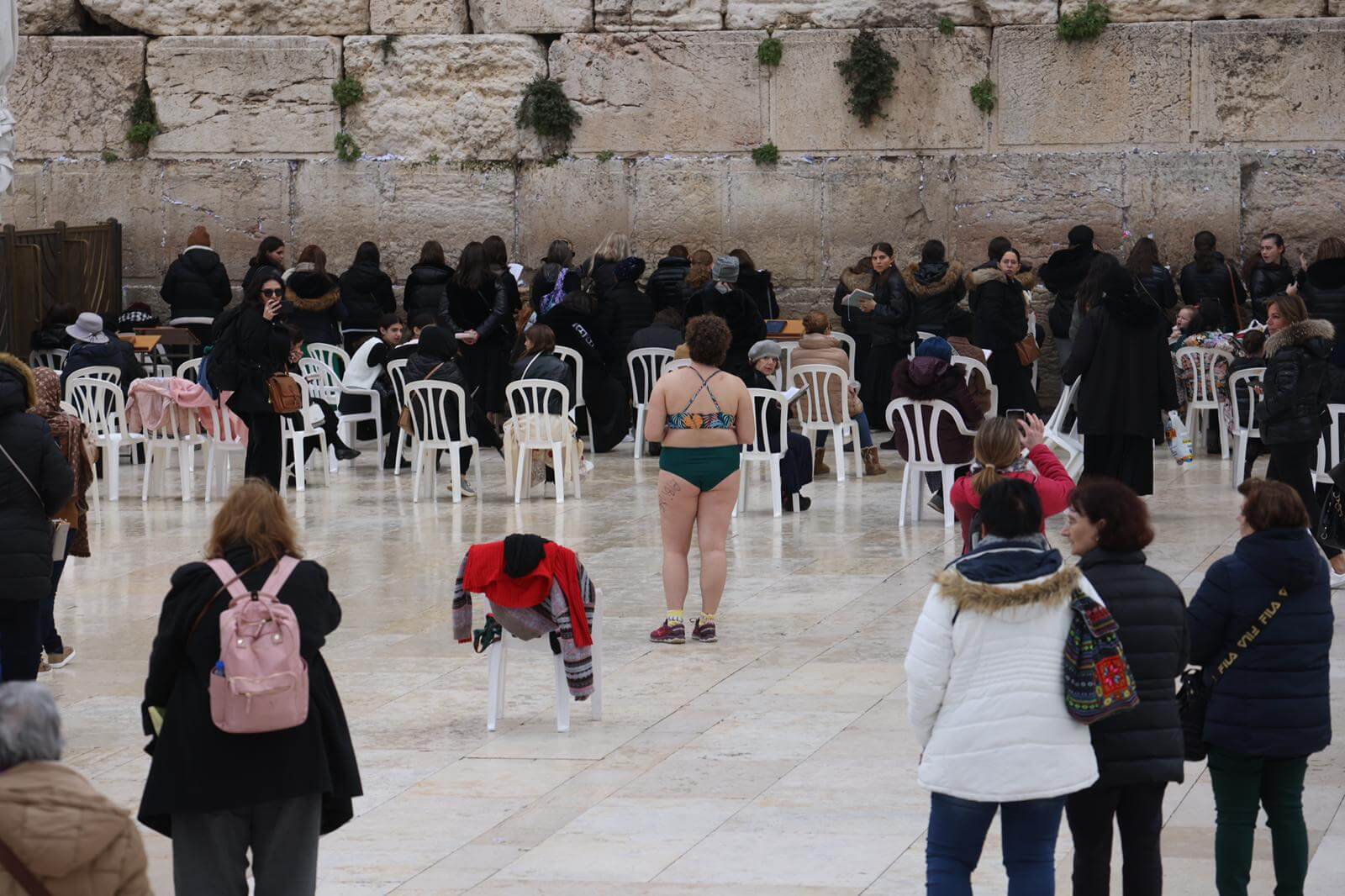At the Western Wall, a woman in her underwear protests modesty limits
Requirements for prayer at the Jerusalem holy site have long been contentious

A woman stands in front of the Kotel in Jerusalem, her discarded clothing on the chair behind her. Photo by Oren Ziv
At the entrance to the Western Wall in Jerusalem, there’s a woman stationed to hand out scarves for any visitors with exposed shoulders or low-cut shirts. For one protester this weekend, however, that wouldn’t have been quite enough.
A 35-year-old woman from Jerusalem, dressed in her underwear, stood in the Kotel complex to protest a proposed bill that would punish anyone dressed or behaving “inappropriately” at the holy site with a hefty fine or up to six months of jail time.
In the bill, inappropriate behavior is defined by Orthodox standards, and prohibits women from wearing ritual garments traditionally reserved for men, such as a tallit or tefillin, as well as reading from the Torah; it also prohibits musical instruments and mixed gender prayer.
After an outcry, the bill was tabled; Prime Minister Benjamin Netanyahu said the holy site would remain exactly the same. Meanwhile, the Sephardic Haredi party Shas, which had proposed the bill, said it would not have been as extreme as it appeared.
“Shas never intended to impose criminal penalties on clothing or musical instruments at the Western Wall. This is cheap demagoguery,” a party representative said in a statement on Thursday. “Every sane person understands this.”
The woman walked into the women’s section before stripping down to a bikini set; “Bibi” was written in black marker in English on her thigh. In pictures and videos circulating on social media, she appears to be praying, and then talking to Orthodox women, who appear angry, on the women’s side of the Western Wall plaza. Police eventually detained the woman, and transported her for interrogation.
Responses varied widely; some people on Twitter and Instagram criticized the woman for desecrating a holy space. Others lauded her chutzpah for standing up to religious limits they see as discriminatory, a symbol of the Orthodox hegemony in Israel. It is not the first time women have used clothing choices to make a stand against Haredi rules. In 2019, a group of women in Jerusalem stripped down to their bras to dissuade Orthodox men who were protesting outside cafes and restaurants that were open on Shabbat; the group of men left to avoid looking at the unclothed women.
The woman, whose identity is still unknown, could theoretically be sentenced to up to three years of prison time under current Israeli laws, which prohibit “offense to religion.” The crime involves harming a holy place or object with “intention of degrading religion or with the knowledge that their action would be seen as insulting religion.”
Shmuel Rabinovitch, the rabbi of the Western Wall, who declares rules and regulations for the site, said, “We are horrified by the despicable act of provocation this morning at the Western Wall plaza, which desecrated the holiness of the site and deeply offended the public and worshippers. The Western Wall is a sacred site for every Jew and Jewess. It is not a place for dispute or provocation of any kind.”
A fight over egalitarian prayer
Shas added the contentious bill to the Knesset agenda because Israel’s Supreme Court was set to hear arguments on the Kotel Compromise, a plan to build a larger egalitarian prayer space at the Western Wall for non-Orthodox prayer. The plan was approved by the government in 2016, but tabled in 2017 under pressure from Haredi political parties. After Shas proposed the controversial modesty bill, Netanyahu announced that the arguments about the Kotel Compromise would also be postponed.
Still, there are regular clashes between more liberal Jewish worshippers and Orthodox Jews at the site. The Women of the Wall, a coalition of women who advocate for egalitarian prayer and read from the Torah, pray monthly on Rosh Chodesh, the first day of the Jewish month; their presence in the women’s section often sparks conflict, riots and arrests.
And over the summer, Haredi protestors interrupted several bar and bat mitzvahs of American Jews in the small existing space set aside for egalitarian prayer at the Kotel, outside the main plaza. The attackers called the American worshippers “Christians” and “Nazis” and ripped pages from prayer books; one man even wiped his nose on the books, an astonishing act given that Jewish law requires extreme respect for books with the name of God written in them.
The clashes signify an increasing division between Israel and the American Jewish community, which is dominated by the religiously liberal Reform and Conservative movements. Members of Israel’s new, right-wing government are also pushing for increased limits on immigration, including revoking the “grandchild clause” of Israel’s right of return law, which allows anyone with a Jewish grandparent to immigrate provided they do not practice another religion.
Though many American Jews feel connected to Israel, both religiously and ethnically, the increasing limits on what Israeli officials recognize as legitimate Judaism could cause American Jewish support to falter.
Officials across the political spectrum in Israel criticized the Shas bill, reaffirming the importance of the Kotel to Jews of all religious affiliations and nationalities. Even before the protester showed up to the Kotel, Netanyahu had reassured the public that “the status quo at the Kotel, which is precious to all Jews, will be kept precisely as it is today.” It’s not clear if that’s a good thing.
























